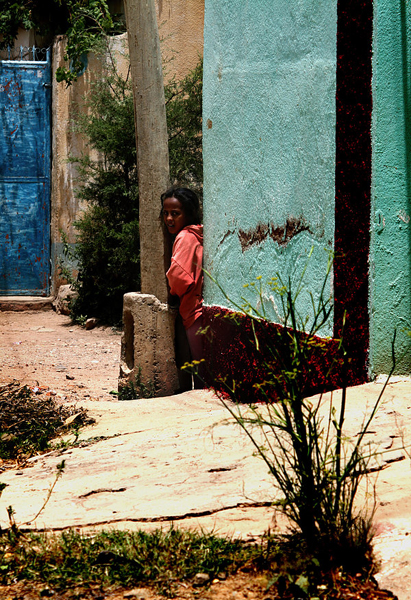s w i f t s & s l o w s: a quarterly of crisscrossings
Not Necessarily Battered
Reflection on Eritrean Children’s Photographs
Abraham T. Zere & Yonatan Tewelde
←back or next→

Forget about child labor for a moment. Children in Eritrea, as in most developing countries, start working at a very young age to earn some cash and help their parents. Why is the boy collecting empty canisters? In a situation where the concept of recycling has not been extensively adapted, such inventiveness—including collecting used glass bottles and worn-out plastic sandals—help sustain the environment. Now having been exposed to the Western notion of child-labor, do I see this as an abuse? NOPE!

Reality sucks, especially in such cases when the gap is immensely wide. Like the majority of soccer fans in Eritrea, he most likely supports the Arsenal sports club as he is wearing their jersey. I assume he knows all the players by name. His ultimate dream could be to play for the club one day. It makes me wonder if he is aware of the promotion he is doing for Emirates Airway. But does it really matter? What is the probability that some people from his home village or town that will fly? Even if they get the rare chance of flying to other countries, do they have a choice of airlines? None!
Of course they have all the time to leisurely discuss many issues, from the mean teacher who graded them unfairly to the last game their school lost. Unlike big towns and cities with many clients—often waiting in line—to shine their shoes; it makes me wonder who the main customers in such suburban places are. As most people would naturally wear plastic sandals—as the boy himself is wearing sandals that do not need shining—who could be the possible customers? What rare occasions could we possibly think of in such places? A wedding ceremony? Visiting to the neighboring town/city? What is more important is the notion of going out to earn money and the socialization moments, no matter the outcome.

“What kind of photographer is this who does not even ask you to smile and look straight ahead? Could he be taking my photo? Well, I am not well-dressed and not prepared. What else is in here that can possibly interest him? Could someone like him—who looks gentle—spend his time to look at this unappealing place that doesn’t even have good flowers? No, he can’t be serious; at least he should have come in the front….”

“Damn! It is the most unpleasant moment when most students have copied their notes from the blackboard and left the class empty. Where are they now? Possibly on their way home to eat their lunches or enjoying the break outside. Damn it! I do not care about the stranger who showed up with his camera. Leave me please, let me finish this and go home, leave me alone.”
Explaining the notion of constant change, the Greek philosopher Heraclitus said, “No man ever steps in the same river twice, for it’s not the same river and he’s not the same man.” In the context of Eritrea, this reads like, “No one can ever take the same photo twice; as most likely some of the people in the photo have crossed to the other end.” The kids symbolize the overarching trend of crossing the borders, crossing the Mediterranean Sea, crossing the Mexican borders…the never ending risky crossing Eritreans have been subjected to for more than a decade. Quick boys! The train is coming!
←back or next→
__________________________________________________________________________________________
Abraham T. Zere: In their official response to his article published in Aljazeera English, the Eritrean ministry of information described Abraham, “a notorious author who routinely engages in a smear campaign against the country.” Maybe they are right. He has been extensively writing on his country’s appalling deterioration of freedom of expression and the pervasive censorship for different media outlets such as The Guardian, The Independent, Index on Censorship magazine, Aljazeera English, Africa is A Country, African Arguments, among others. Abraham is currently serving as executive director of PEN Eritrea in exile and co-edited Uncensored Voices: Essays, Poems, and Art Works by Exiled Eritreans (2017).
To see more of Abraham Zere’s writing you can go to:
abrahamzere.com
Yonatan Tewelde has been working as a video producer and photographer in Eritrea since 2007. He mainly works as a videographer and editor in local films and music videos. He has taken photographs over the years in different parts of Eritrea attempting to capture an up-close representation of his encounters.
To see more of Yonatan Tewelde’s work you can go to:
yenetam.wixsite.com/yonatantewelde


